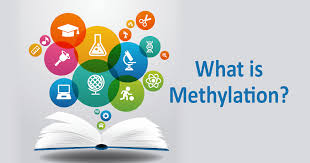What is methylation? Methylation is an essential biochemical process that happens in every cell. We need our methylation processes to be working correctly to optimize our health! The good news is we can use standard tests to see if the methylation cycle is working and we can use specific diet, lifestyle factors and nutritional supplements if need be!
Methylation – Look how important it is!
- Energy production
- Making, repairing, transcribing DNA
- Gut, skin, heart, eye and health
- Making neurotransmitters for mental health
- Detoxification of chemicals, hormones and heavy metals
- Keeping our immune system healthy
- Lowers homocysteine, which is damaging to the body when elevated
Testing for methylation – how do I know my methylation cycle is working?
- Blood homocysteine – optimal 6-7 (high homocysteine damages the blood vessels)
- Urine or blood methylmalonic acid – indicates b12 status
- Blood or urine methylation panel
- Blood test including CBC – check MCV, if it is above 95, could mean you are low in methyl B12
- Urine organic acids – to find out your overall B vitamin status and if toxins relating to poor methylation are circulating in your body
Genetically, many have difficulty making the enzymes involved in methylation. We can test using the 23andme or ancestry genetic test which decodes your genome and then running your raw data through the Stratagene program. Blood test for MTHFR is also available from standard labs. Testing MTHFR only, does not give the whole picture of the methylation pathway.
Those who have the MTHFR genetic SNP (single nucleotide polymorphism) or defect (over 60% of the population) are predisposed to increased risk of cardiovascular disease, auto-immune conditions, blood clots, cancer and mood disorders. I have been studying genetics and can now effectively interpret these tests to help bypass the genetic issue(s) you may have. If you have test results or want to be tested, please contact us for a genetics consult.
Vital nutrients for your methylation cycle!
- methyl folate or 5-MTHF (NOT Folic acid)
- methyl cobalamin (active b12)
- riboflavin-5-phosphate (active b2)
- pyridoxal-5-phospate (active b6)
- choline, helps poor methylators run a side pathway
- vitamin D3
Check it out: DRUGS that DEPLETE our B vitamin stores
Other things I can do for the Methylation cycle:
We live in a world filled with toxins and avoiding them as much as possible will alleviate some of the burden on your methylation cycle. You can start by going fragrance free, removing heavy metals from your mouth, avoiding eating tuna and other large mercury containing fish, enjoy eating organic fruits and veggies and wild salmon as well as organic grass-fed meats.
Nutrients best for this cycle are folates. So you can easily eat plenty of folate containing foods! You can enjoy 2-3 cups per day of dark leafy greens like spinach, broccoli, Brussel sprouts, avocado, and asparagus. Liver and eggs also contain folates. Be mindful of the sources for these. Other nutrients that have shown promise are taurine, betaine, magnesium and n-acetylcysteine or NAC.
What is homocysteine?
Homocysteine is an amino acid made during methylation and eliminated by methylation. How can that be? It is a cycle! It is made from methionine, an amino acid found in meat and eggs. The dangers of high levels of homocysteine include damage to the cardiovascular system by damaging the cells of the lining called endothelial cells. Homocysteine damages these cells by disrupting the antioxidant system, damaging their mitochondria, stimulating inflammatory cytokines, and altering protein formation. These changes can lead to atherosclerosis, stroke, and clotting issues. High homocysteine is also linked to depression, neurological conditions such as dementia, Alzheimer’s and Parkinson’s diseases, and complications of diabetes, and ED. It has also been found to be high in those who have age related hearing loss and macular degeneration.
Measure your homocysteine level!
Research shows the goal level of homocysteine in the blood is level BELOW 8, optimally 6-7. The ‘normal’ range is less than 15! Studies show your risk of cardiovascular disease increases 110% if your homocysteine level is between 12 and 15.
There are diet and lifestyle factors that can increase homocysteine, as well as a lack of cofactors/nutrients of the methylation cycle. A diet high in meat and dairy contains high levels of methionine and increase homocysteine. Also, a vegan diet with inadequate B12 can raise levels. One of the best diets to help lower homocysteine is the Mediterranean Diet which includes vegetables, olive oil, whole grains, and lower amounts of meats and dairy.
The best exercise is strength training and aerobic exercise. Too much exercise can deplete B vitamins and the effects can be mitigated by taking extra B’s before or after the exercise session.
What do I do if I am sensitive to methyl folate supplements?
Some people have reactions to this vitamin, usually they have MTHFR and other methylation SNP’s. This can be overcome working with a knowledgeable practitioner. First thing is to have a good amount of magnesium and trace minerals including molybdenum on board. Also taking all the B vitamins other than the methylated ones first. You can of course include high folate foods in the diet, and try using folinic acid as a supplement. If you try methyl folate after all this is in place, begin with the tiniest amount possible and work up very slowly. If you have reactions, niacin 50mg lozenge can calm it down quickly.
Learn more about methylation!
Hope this helps!
LISTENING TO YOUR BODY
The body talks to us in signs and symptoms. How do we know we are becoming imbalanced? Our body is wise, and will tell us. But will we listen? And will we then take action? The key is to catch things early. Once we notice, we can look inward and find out what we did that caused that issue and change it. If you need help, I am here as a guide for you. Learn more about Naturopathic philosophy


